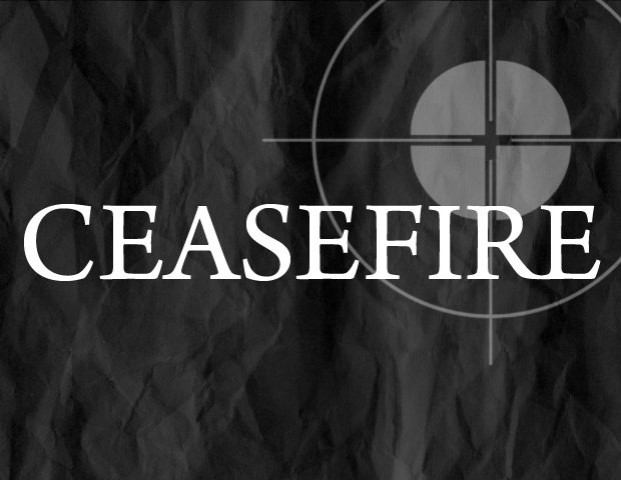Special report: Anatomy of ceasefire announcement
TTP directs to all its affiliated militant groups to suspend their activities for a month.

TTP directs to all its affiliated militant groups to suspend their activities for a month. DESIGN: MARIAM ESSA
With the peace process in its last moments, members of the negotiating committees would have been staring impatiently at their phones and glued to the news on Friday in anticipation of a last-minute breakthrough.
There was reason for their hope amidst an otherwise bleak situation for the talks, as The Express Tribune has learnt through background interviews of those in the thick of things over the last week.
The previous night, Thursday, a Tehreek-e-Taliban Pakistan (TTP) Shura member had spoken directly to a senior government official secretly over the phone. All the details of the conversation are unknown, but the TTP member would tell the official that the organisation would agree to the government’s demand for a ceasefire – but they had their own conditions should this be the case. First, the government should immediately welcome the call when it is made. Second, no official should deride the decision as a victory for the government. Else, the ceasefire would immediately be called off by the TTP. The conversation ended on this note – leading to a belief that the ceasefire announcement would come on Friday – as was published on the front page of The Express Tribune that day.
Following the phone call, there was some hope on Friday morning amongst a small circle of the negotiation teams. But no announcement came from the TTP, and the nerves began to tingle. This could be it for the moribund peace process.
Word from tribal regions had it that the top advisory council of the TTP, after its internal consultation, had agreed to announce cessation of hostilities against the government - but the much awaited announcement could not be made on Friday due to difference of opinion among some affiliates. This was something that a member of the government’s negotiation team, Rustam Shah Mohmand, also echoed on Saturday.
Patience was running thin by the time Saturday came and the end was in sight. Mohmand had said on Saturday morning that the government was keenly waiting for a promised announcement by the TTP – but time was running out. “The government will take its own decision in case the TTP failed in announcing its decision till evening today (Saturday),” he had said ominously.
Hours before this seeming deadline for a response, it came: The TTP declared a month-long ceasefire. Making its announcement public with a brief statement to the media, the TTP directed to all its affiliated militant groups to suspend their activities for the stipulated period.
The conversation between the senior government official and the TTP was not out of the blue.
There had been some buildup of goodwill behind the scenes despite the public breakdown of talks following a string of attacks claimed by the TTP. The slaughtering of 23 paramilitary troops, in custody since 2010, by the Mohmand chapter of the TTP on February 17 seemed to be the tipping point for the talks – which had begun on February 5 following an official announcement by Prime Minister Nawaz Sharif on the floor of the National Assembly.
After the killing of the FC men, the government had announced that the formal talks between the two negotiation committees would cease forthwith as violence and talks could not go on simultaneously. The military had begun daily aerial bombardment of TTP strongholds.
But, despite the end of formal talks and the continued aerial bombardment, there was still some movement over the last week in the background.
As reported by The Express Tribune, Interior Minister Chaudhry Nisar Ali Khan, on the insistence of the TTP intermediary committee, arranged an ‘informal’ meeting of the two committees on February 24, which ended with the government’s reiteration of its demand of a ceasefire by the TTP for the resumption of the peace talks.
Maulana Samiul Haq, the TTP’s chief intermediary, had assured the minister of a positive response from the organisation but requested him to stop aerial attacks, which he said would pave the way for an end of hostilities. The minister, in response, reiterated the government’s stance for a unilateral ceasefire. But what seemed to be a persisting stalemate during the meeting turned into something positive for the peace initiative. After the informal talks, Rustam Shah Mohmand had said that the government’s agreement to talks with the TTP, though ‘informal,’ sent the right message. “This goodwill gesture on the part of the government reflected its desire to have a successful result of the negotiations.”
That meeting seemed to fuel the Thursday phone conversation. And the Thursday phone conversation led to the month-long ceasefire by the TTP. The government, as promised, has welcomed the call, and no negative comments seem to have made.
Published in The Express Tribune, March 2nd, 2014.




1733130350-0/Untitled-design-(76)1733130350-0-208x130.webp)














COMMENTS
Comments are moderated and generally will be posted if they are on-topic and not abusive.
For more information, please see our Comments FAQ